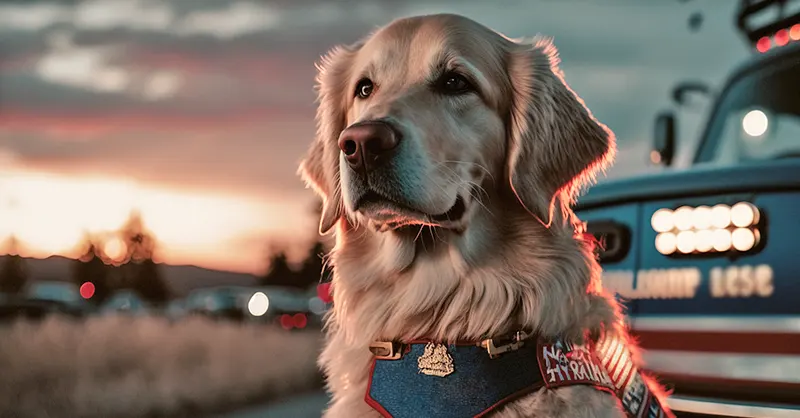Archive for the ‘Service Dog Tips’ Category
Residents of Pennsylvania who require a service dog are legally recognized under federal and state law. The ADA and the Pennsylvania Human Relations Act protect owners of service dogs in the Keystone State.
Service dogs in Pennsylvania must be allowed in areas open to the public, even if there is a policy that prohibits entry to normal dogs. Read on to learn more about service dog rights and requirements in Pennsylvania.
Health RequirementsTo own a service dog, the handler must have an eligible physical or mental health disability. A “disability” is defined as a physical or mental impairment that substantially limits a major life activity (such as the ability to work, socialize or attend school).
Physical disabilities include health issues like visual impairment, seizures, and hearing loss.
Psychiatric disabilities include conditions like severe depression, chronic anxiety, PTSD, autism, and learning disabilities. Service dogs used for mental health conditions are known as psychiatric service dogs.
Training RequirementsIt is not enough just to have a qualifying disability. A service dog must also perform a job or task directly related to the handler’s condition.
Service dogs are called upon to perform countless jobs. Tasks for physical disabilities include actions like pulling wheelchairs, guiding people who are blind, and providing seizure assistance.
Tasks for psychiatric disabilities include retrieving medication, providing tactile stimulation during moments of crisis, calming the owner during panic attacks, and buffering in crowded environments.
In Pennsylvania, you can train a service dog by yourself or with the help of a professional trainer. Many handlers prefer to do part or all of the training to develop a deeper bond with their animal.
Identification Requirements for Service Dogs in PennsylvaniaMost service dog owners use service dog paraphernalia like ID cards, vests, tags, and certificates to signal to others in public that their dog is special.
You are not required to have these items in Pennsylvania to demonstrate that you own a service dog. These items, however, can prevent unwanted interactions and interference with your dog while on duty. Service dog owners prefer to use these items so others can easily identify their dog as a service dog, not a regular pet.
Stores, restaurants, and other public venues in Pennsylvania can verify a service dog by asking two questions when the disability is not obvious: 1. Is the animal a service dog required for a disability? and 2. What work or task has the service dog been trained to perform?
Service Dog Registration in PennsylvaniaRegistering a service dog in Pennsylvania is optional. You may have to register your dog if there is a local rule that requires registration of all dogs in a jurisdiction, but no service dog-specific registration is necessary.
Service dog owners, however, choose to voluntarily register their dogs for several reasons. Registering a service dog with a service like Service Dog Certifications enters the dog’s information into a searchable database linked to an ID card.
The ID card can be used to show others that you own a service dog or be presented for convenience when third parties unaware of service dog verification rules continually demand documentation.
Psychiatric Service Dog RequirementsMost people associate service dogs with the type that assist with physical disabilities. However, many service dogs help with invisible disabilities in the form of psychiatric illnesses.
In Pennsylvania, psychiatric service dogs have the same legal rights as other types of service dogs. They are just as important to their handlers for managing their health condition.
Psychiatric service dogs perform an incredible variety of tasks, including the following:
Deep pressure therapy Reminding the owner to take medication Posting and watching the owner’s back in open areas Tactile stimulation Alerting the owner to oncoming threats or episodes Disrupting repetitive self-destructive behaviors Where can service dogs go in Pennsylvania?Service dogs in Pennsylvania are allowed to accompany their owners in public areas that don’t allow pets. For example, a handler can bring their service dog to:
Restaurants Shops Hospitals Schools HotelsService dogs also have housing rights. They must be allowed to live with their owners, even in buildings that don’t allow dogs.
Service dogs can also go into airports in Pennsylvania and board flights with their handlers free of charge. Flying with a service dog requires specific documentation to be submitted to the airline before boarding.
No matter where a handler takes a service dog, it must always be under the full control of its handler. A service dog that is acting unruly, aggressive, or threatening the health and safety of others can be asked to leave the premises.
In Pennsylvania, service dogs are allowed to accompany their owners in public areas, including inside restaurants. Emotional Support Animals in PennsylvaniaPennsylvania also recognizes another type of assistance animal – emotional support animals. ESAs are similar to psychiatric service dogs in that they help with mental health conditions. However, unlike service dogs, ESAs do not require specialized training.
Emotional support animals also have more limited rights. They are allowed to live with their owners free of charge in no-pets housing, but they do not have broader public access rights.
Another difference between ESAs and service dogs is that an ESA can be an animal other than a dog. While service animals are limited to dogs, ESAs can be dogs, cats, birds, gerbils, fish, turtles, and other small household pets.
To qualify for an ESA in Pennsylvania, the tenant must provide a signed ESA letter from a healthcare professional licensed for Pennsylvania.
Service Dog Legal Developments in PennsylvaniaIn 2018, Pennsylvania passed the Assistance Animal and Service Animal Integrity Act. This law recognizes the importance of service dogs and emotional support animals in the state. The bill was also intended to prevent individuals from fraudulently representing that their animal is a service dog or emotional support animal without the proper qualifications.
Violating the rights of a service dog owner in Pennsylvania can have legal consequences. For example, in a recent case, a 16-year-old girl successfully sued her school for failing to properly accommodate her service dog and won a $100,000 settlement.
What the ADA says: Police, like any other third party, can verify a service dog by asking two questions: 1. Is the dog a service dog required for a disability? and 2. What work or task has the dog been trained to perform?
Do you have to provide the police with anything else? Just like with other third parties, you can voluntarily show a service dog ID card, vest, tag, or certificate. However, you can’t be denied entry if you don’t have or just forgot to bring these items.
How service dog accessories make life easier 🐕🦺 : Rather than explaining their situation to every passerby in a no-dog environment or having people inappropriately touch their dog, service dog owners use these items to visually inform others and keep them at a safe distance.
Countless service dog handlers are repeatedly badgered for ID cards and certificates to prove they own a service dog. Therefore, many owners have these items handy instead of getting into recurring debates about service dog verification procedures.
What else to keep in mind: Remember, most people are not as well-informed about service dog rights. You can present your service dog ID card, certificate, or other accessories, but if you don’t have these items on you, the best course of action is to calmly explain that answering the two questions defined by the ADA is sufficient.
There is no technical minimum age for a service dog, but practical considerations limit how young a service animal can be. Due to training requirements and developmental concerns, a puppy is generally not eligible as a service dog.
Under ADA rules, service dogs in training are not considered full-fledged service animals. A service dog must finish training before being granted public access rights.
Under the ADA, the dog must already be trained before it can be taken into public places.
ServiceDogCertifications.org
Some states and localities may have their own laws that allow for service dogs in training to be given public access rights. However, even if your local laws grants rights to a service dog in training, a young puppy is still likely ineligible to qualify as a service dog.
Puppies generally can’t qualify as service dogs for two main reasons:
1.A puppy in its early developmental stages is not ready for formal training.Many trainers and organizations do not recommend beginning formal service dog training until a dog is at least 6 months of age. A very young puppy may not be ready for the rigors of undergoing intensive task training. Many trainers encourage owners to allow their puppies to be puppies, and that means allowing them to play, socialize and explore their curiosities.
2.Service dog training is an involved process that can require several months to years, depending on the skillset needed.The other reason a puppy usually can’t be a qualified service dog is that the actual training process can take significant time. Under ADA rules, a service dog must be individually trained to perform a job or task relating to the handler’s physical or psychiatric disability.
Service dogs are trained for an enormous variety of tasks. Simple tasks can be mastered within weeks or months, but complex tasks or sets of interrelated tasks can take years to master.
In addition to disability-related task training, a service dog must also be trained for public access skills. That means the ability to be in public on best behavior, under full control, and without becoming distracted by the environment. It can take time for a puppy to learn and mature into these abilities.
Once a service dog is fully trained, handlers can use accessories like ID cards, vests, certificates, and tags to easily identify their animal as a service animal. ServiceDogCertifications.org specializes in providing these tools to service dog owners for their convenience, safety, and privacy.
.about-the-author-wrap a { padding: 20px; border-radius: 10px; background-color: #f2f2f2; color:#444; display:block; text-decoration: none !important; margin: 40px 0; font-size: 17px; } About the author: Shannen Standiford is a trainer and applied animal behavior consultant in San Diego, California. She specializes in service animal training, behavioral issues such as separation anxiety, reactivity, aggression, and more. She is a supporting member of the IAABC and opened her own 1:1 training business under the name Pups on the Coast to help others understand their dog on a deeper level and create a bond with their pet that they’ve always dreamed about.






